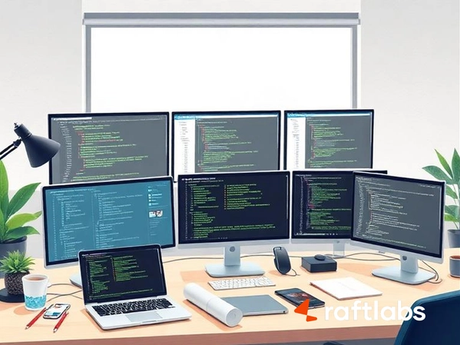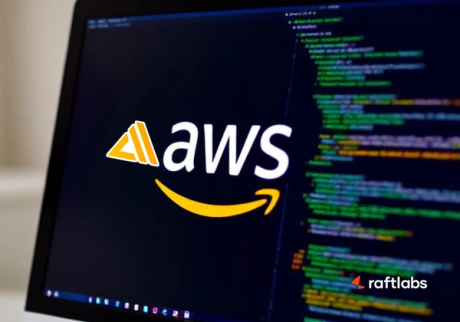
Top Conversational AI Development Companies
- Riya Thambiraj
![Riya Thambiraj]()
- Artificial Intelligence
- Last updated on
There was a time when chatbots felt clunky and robotic. That time’s over. In 2025, conversational AI is powering real business outcomes, handling support, collecting insights, and guiding users in ways that feel natural and fast.
The global speech and voice recognition market is on a steep rise. It is expected to grow past $80 billion by 2032, driven by increased demand for hands-free, AI-powered user experiences across industries.
An overwhelming 97% of organizations are already tapping into voice technology, using it to transcribe meetings, analyze support calls, or run voice-based assistants as part of their daily operations.
From replacing static forms to running entire onboarding flows, conversational AI is helping teams move faster, cut costs, and stay closer to their users.
That's where conversational AI development companies in 2025 come in.
If you’re this person, read on
This guide is for:
Founders building AI-first products
Product managers replacing forms and surveys with smart flows
CTOs and tech leads scaling automation
Heads of customer experience streamlining support
CMOs driving engagement with AI-powered messaging
Operations leaders automating workflows and service delivery
Innovation or digital transformation heads evaluating AI partners
Whether you’re a startup or an enterprise team, choosing the right conversational AI development partner can make or break your product quality and delivery speed.
How Can This List Help You?
We’ve shortlisted teams that have actually built and deployed high-impact conversational AI systems, chatbots that serve thousands of users, AI-powered remote health platforms, and voice chat tools used in live decision-making.
You won’t find generic dev shops here. These are companies with strong technical depth, proven delivery, and business understanding.
Why Trust This List?
Over the last 18 months, RaftLabs has been building and deploying AI solutions across sectors like healthcare, hospitality, and customer support.
We evaluated each company based on:
Technical capabilities and product depth
Real-world case studies and delivery history
Industry focus and adaptability
Transparency and team involvement
Client reviews and external recognition
What You’ll Find Inside?
This guide features 10 proven conversational AI development companies that are actively shaping the space in 2025. For each one, you’ll get a quick overview of who they are, what they do best, and where they’ve delivered results.
We’ve included a breakdown of their key services, AI capabilities, industries they focus on, and the types of clients or projects they’ve worked with.
You’ll also find practical details like location, pricing range, team size, and what kind of businesses they’re best suited for.
The goal is to give you enough context to compare, shortlist, and confidently pick the right partner, whether you’re building your first chatbot or scaling AI across multiple workflows.
Before we dive into the list, let’s take a moment to understand what conversational AI really means and why it matters for modern businesses.
What is Conversational AI?
Conversational AI refers to technologies that enable machines to understand, process, and respond to human language in a natural, intelligent way.
It powers tools like chatbots, voice assistants, and virtual agents that can carry out real-time conversations with users.
Unlike basic rule-based bots that follow fixed scripts, conversational AI uses natural language processing (NLP), machine learning (ML), and sometimes large language models (LLMs) to handle more complex queries, remember context, and improve over time.
You’ll find conversational AI in customer support chatbots, voice interfaces in mobile apps, appointment schedulers, onboarding assistants, and more, across industries like healthcare, finance, retail, and SaaS.
It’s not just about talking, it’s about understanding, learning, and responding in a way that adds value for both the user and the business.
Why Businesses are Investing in Conversational AI
Over the last five years, the adoption of conversational AI in companies has moved from experimental to essential.
What began as simple rule-based chatbots has evolved into complex, AI-powered systems capable of handling nuanced human conversations across platforms, without human intervention.
Today, businesses across sectors, from healthcare and banking to logistics and retail, are integrating these systems to solve very real operational challenges.
Here’s why serious investment is pouring into this space:
1. Unmatched Scalability in Customer Service
Traditional customer service teams grow linearly. If ticket volume doubles, the team has to double.
But with AI, especially solutions offered by the top conversational AI companies, you can handle 10x the conversations without increasing headcount.
This becomes especially critical during peak seasons, product launches, or crisis periods.
2. 24/7 Support that Doesn't Degrade in Quality
A common problem in human-led support systems is inconsistency. Shift changes, burnout, and training gaps lead to varying customer experiences.
Conversational AI platforms maintain a consistent tone, accuracy, and availability—24/7.
Customers get instant answers, no matter the hour, without waiting in a queue.
3. Real-time Personalization at Scale
Modern conversational AI platforms now allow bots to access user data in real time. This means responses can be tailored based on user history, past interactions, purchase behavior, or even location capabilities that once required manual lookup by human agents with CRM access.
A skilled conversational AI development company plays a crucial role here by designing secure, real-time integrations with CRMs, analytics tools, and backend systems, ensuring that the bot has the right data at the right moment to deliver meaningful, context-aware conversations.
4. Cost Reduction without Sacrificing Experience
While the initial integration may require investment, most companies recover costs within months through reduced support costs, shorter resolution times, and improved customer satisfaction scores.
AI not only reduces cost, it also increases the capacity to serve more users, faster.
5. Omnichannel Presence for Modern Customers
Businesses are no longer tied to web chat alone. The top conversational AI platforms now enable bots to function on WhatsApp, Facebook Messenger, SMS, voice assistants like Alexa, and even IVR systems.
Customers can begin a conversation on one channel and continue it seamlessly on another, without losing context.
6. Automation of Internal Workflows
Forward-thinking companies are not just deploying AI for customer interactions.
Internal support systems for IT helpdesks, HR FAQs, or procurement, are now powered by bots built by leading conversational AI chatbot companies.
These systems resolve repetitive internal queries and reduce dependency on human support teams.
7. Improved Data Quality and Feedback Loops
Conversational AI solutions automatically log all interactions, making it easier to identify user pain points, product issues, and service gaps. That data feeds into dashboards and analytics tools, creating a feedback loop for continuous improvement.
In short, the shift toward automation is not just about cutting costs. It’s about rethinking how businesses interact with people, customers and employees alike.
Partnering with capable conversational AI platform providers ensures that automation becomes an asset, not a liability.
Top Conversational AI Development Companies
Let’s dive into our carefully curated listed of top conversational AI companies.
| Company Name | Hourly Rate | Clutch Rating |
|---|---|---|
| RaftLabs | $25–$49/hr | 4.9/5 |
| Openxcell | < $25/hr | 4.8/5 |
| Velvetech | $50–$99/hr | 5/5 |
| Attract Group | $25–$49/hr | 5/5 |
| A3Logics | $25–$49/hr | 4.9/5 |
| Master of Code Global | $50–$99/hr | 4.7/5 |
| InvoZone | $25–$49/hr | 4.9/5 |
| InnovationM | $25 - $95/hr | 4.5/5 |
| Beyond Key | $25–$49/hr | 4.5/5 |
| Matellio | $50–$99/hr | 4.8/5 |
1. RaftLabs
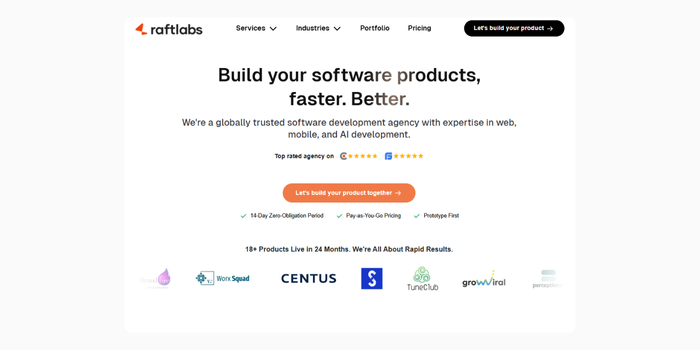
RaftLabs is a nimble, product-led AI software Development company delivering modern conversational AI and SaaS platforms with speed and precision.
From building an AI chatbot platform for product teams to launching a remote patient monitoring app with predictive analytics, and a real-time voice chat tool for media strategy, RaftLabs consistently turns ideas into high-impact products.
Trusted by brands like Aldi, Energia, and Sanbra Fyffe, their hands-on, founder-led approach sets them apart from traditional agencies.
Key Services
Conversational AI chatbots with dynamic multi-intent flows
Custom AI chatbot development (voice + text)
NLP-powered customer engagement AI agent Development
HIPAA-compliant AI telehealth apps for chronic care
Voice-based apps for real-time, anonymous collaboration
End-to-end SaaS product development with integrated AI
Founder-involved product delivery with transparent weekly sprints
Industries Served
Healthcare, Media & Communication, MarTech
Ideal For
Startups and modern enterprises seeking fast, lean, and high-impact conversational AI or SaaS tools delivered by a small, sharp, and transparent team.
Location: Fully remote team (Global)
Hourly Rate: $25–$49/hr
Clutch Rating: 4.9/5
2. Openxcell
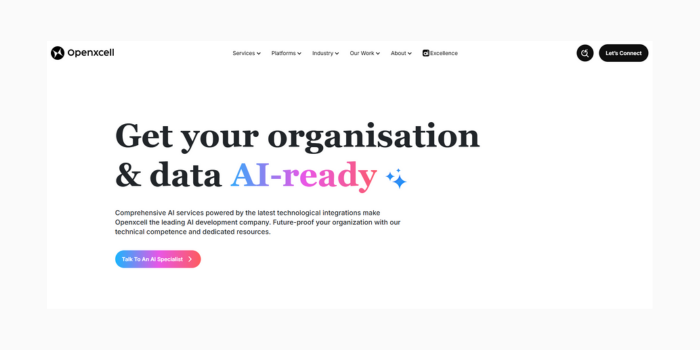
Openxcell is a global IT consulting and AI development company known for delivering cutting-edge conversational AI solutions across industries.
With deep technical expertise and a flexible collaboration model, they help businesses scale intelligent automation with confidence like building recruitment bots for platforms such as JobTatkal or real estate assistants like Cribzzzz.
Key Services
Custom chatbot development (voice + text)
LLM-powered virtual assistants
AI recruitment and resume bots
Domain-specific AI bots for fintech, logistics, and healthcare
Fraud detection and product locator AI
Integration with CRMs, VoIP, cloud platforms
Industries Served
Healthcare, Fintech, eCommerce, Real Estate, Logistics, Education, Retail
Ideal For
Enterprises looking for secure, scalable, and highly customized AI chatbot systems
Location: Ahmedabad, India
Hourly Rate: < $25/hr Clutch Rating: 4.8/5
3. Velvetech
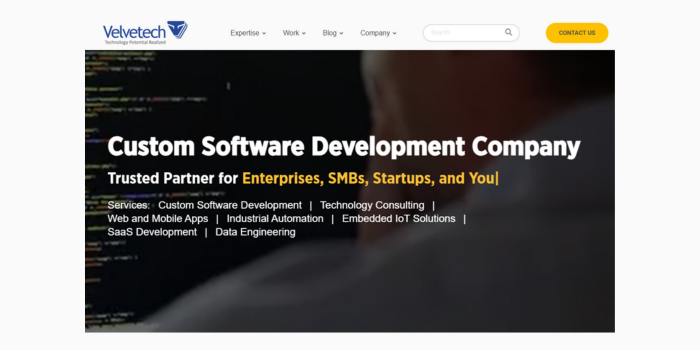
Velvetech is a US-based software development and consulting company with over two decades of experience helping enterprises and startups build scalable conversational AI, automation, and IoT-powered systems.
Their work spans industries like healthcare, insurance, and logistics, recently helping a dental insurance firm streamline document workflows using custom AI integrations.
Key Services
AI chatbot and virtual assistant development
NLP-powered customer engagement agents
Conversational intelligence for call centers (real-time transcription, analytics)
Workflow and document automation using AI
IoT and conversational AI integration
Industries Served
Healthcare, Fintech, Logistics, Automotive, Insurance, Transportation, Manufacturing, Dentistry, Contact Centers
Ideal For
Companies seeking tight AI integrations across CRMs, call centers, or IoT platforms
Location: Chicago, USA
Hourly Rate: $50 - $99 / hr
Clutch Rating: 5/5
4. Attract Group
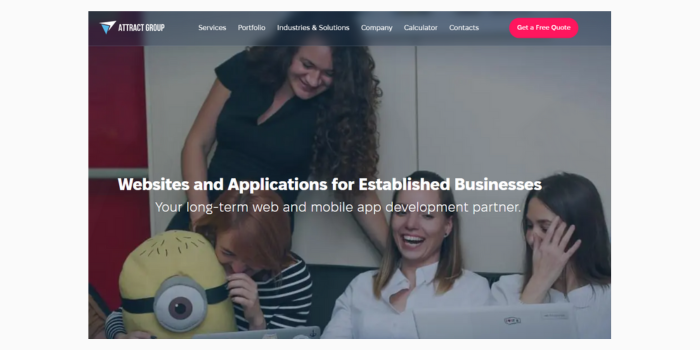
Attract Group is a web and mobile development agency helping startups and enterprises drive digital transformation through custom-built platforms.
While their focus is broader than conversational AI, their UX expertise and rapid launch capabilities make them a solid tech partner for businesses exploring automation or AI integration like Cypher, a creator platform built for fan monetization.
Key Services
Web and mobile app development
Custom CRMs, ERPs, and eCommerce platforms
UI/UX design and digital product consulting
Startup MVP development and support
Industries Served E-commerce, Retail, Startups, Events, Urban Arts
Ideal For
Startups or SMBs seeking tailored web and app platforms with room to scale into AI/automation
Location: Amsterdam (NL), Las Vegas (USA)
Hourly Rate: $25–$49/hr
Clutch Rating: 5/5
5. A3Logics
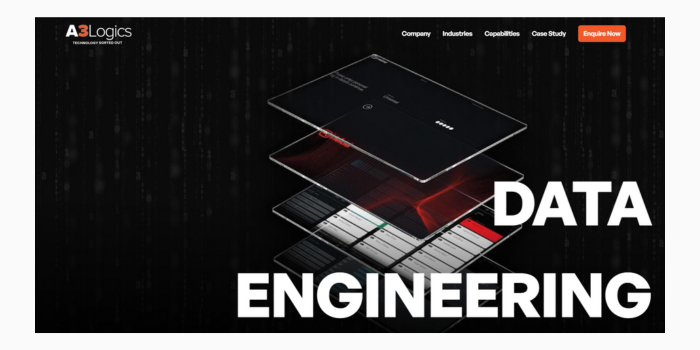
A3Logics is a global IT and AI services company delivering enterprise-grade conversational AI and automation for finance, healthcare, and eCommerce.
Known for fusing AI with business workflows, they’ve helped fintech platforms like Cred unlock $2.6M in hidden revenue by combining customer experience automation with deep data integration.
Key Services
Custom chatbot and voicebot development
NLP-powered assistants and BI chatbots
AI-led sentiment analysis and workflow automation
Generative AI for personalized user interactions
CRM, fintech, and healthcare-specific bot solutions
Industries Served
Fintech, Healthcare, CRM, Logistics, Insurance, E-commerce, Media
Ideal For
Enterprises and funded startups needing tailored AI-driven platforms with real-time analytics and long-term support
Location: Jaipur, India (Global presence)
Hourly Rate: $25 - $49 / hr
Clutch Rating: 4.9/5
6. Master of Code Global
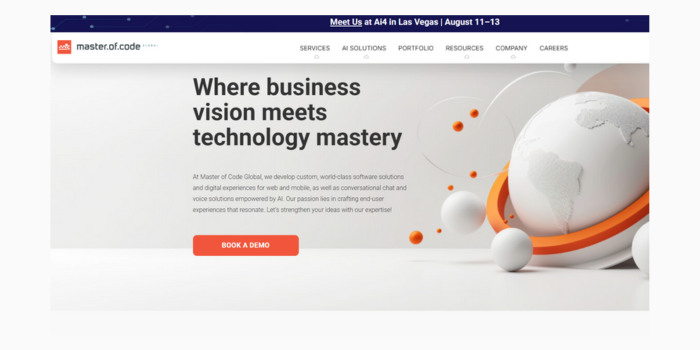
Master of Code Global is a seasoned player in conversational AI, delivering powerful chatbot and voice assistant solutions for enterprise and consumer brands.
With deep technical expertise and a strong product mindset, they’ve built systems used by 10,000+ Shopify stores and collaborated with giants like T-Mobile, Estee Lauder, and MTV.
Key Services
Custom chatbots and voice assistants with generative AI
Multichannel deployment (Dialogflow, Lex, Rasa, Azure)
BotFactory platform for large-scale chatbot delivery
Integrations with LivePerson, Salesforce, Stripe, Zendesk
Commerce-focused conversational apps for Shopify
Industries Served
Retail, eCommerce, Media, Telecom, Customer Service, BFSI, Consumer Brand
Ideal For
Enterprises and brands needing secure, design-led conversational AI experiences with global scale
Location: Global presence (main teams in North America & Eastern Europe)
Hourly Rate: $50 - $99 / hr
Clutch Rating: 4.7/5.0
7. InnovationM
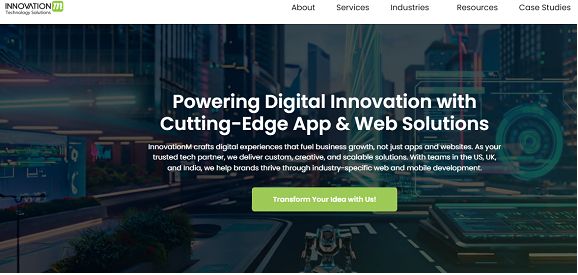
InnovationM's been around since 2010, working out of India with about 250 people on the team. They've done projects for over a thousand clients at this point, mostly startups trying to figure out AI and larger companies that need something custom built. As an AI development company, they focus on building systems that actually get deployed and used.
Here's what's actually useful about them: they don't get stuck in research mode. You won't find them publishing papers or building demos that never ship. They build AI stuff that's supposed to do something specific like cut your support costs, speed up some internal process, or help you sell more. The team handles the full stack, so you're not juggling five different vendors. They've done health prediction tools, customer service bots that don't suck, voice assistants, and conversation systems that work in multiple languages.
Key AI Services
Agentic AI
Data Engineering
Cloud Modernization
Generative AI & LLMOps
Agentic AI
User Experience (UX) & AI
Industries Served
InnovationM focused industries for AI development services are Finance, Banking, Insurance, Telecom, Healthcare, E-commerce, Manufacturing and many more.
Ideal For
Enterprises looking for applied AI solutions with measurable ROI, or startups needing full-stack AI development from data infrastructure to user-facing features
Location: Headquartered Noida, India (USA, UK, Canada, UAE)
Hourly Rate: $25 - $95/hr
Clutch Rating: 4.5/5
8. InvoZone
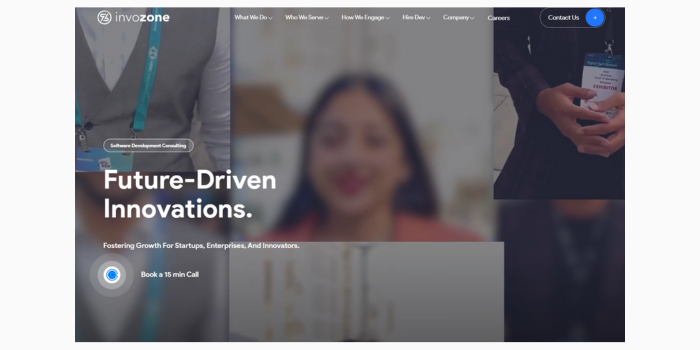
InvoZone is a Malaysia-based tech company helping startups and enterprises build AI-driven platforms, with a growing footprint in fintech, SaaS, and retail.
Their conversational AI solutions power everything from stock prediction bots to smart PDF form converters, blending automation with real-time analytics for improved business outcomes.
Key Services
AI chatbot development for fintech, support, and workflow automation
Interactive form automation via Easyfill.ai
AI/ML-powered investment recommendation bots
Real-time data analytics and chatbot integration
Resource augmentation and dedicated tech teams
Industries Served
Fintech, Financial Analytics, Enterprise SaaS, Retail, Startups
Ideal For
Startups and growing SaaS companies needing cost-effective, flexible AI chatbot solutions backed by strong analytics
Location: Kuala Lumpur, Malaysia
Hourly Rate: $25–$49/hr
Clutch Rating: 4.9/5
9. Beyond Key
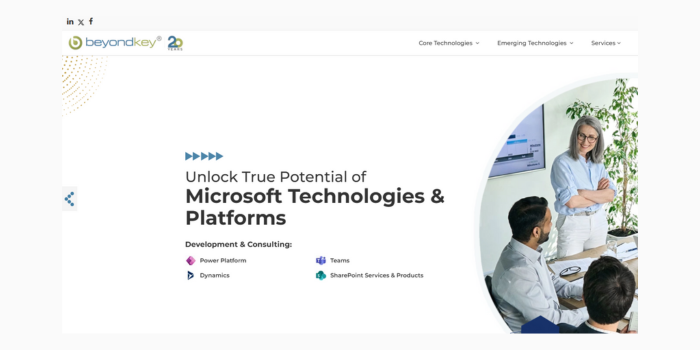
Beyond Key is a Microsoft Gold Partner and digital transformation provider delivering AI-powered chat and voice assistants along with deep expertise in business intelligence platforms.
Their solutions are especially well-suited for enterprises that rely heavily on Microsoft technologies and require both automation and advanced analytics under one roof.
Key Services
AI chatbot and voice assistant development (web, mobile, IoT)
Voice skill creation for Alexa and Google Home
BI solutions with Power BI, Tableau, Domo
OCR + NLP automation for form processing and analytics
Microsoft and open-source platform integrations
Industries Served
Insurance, Healthcare, Aviation, Retail, BFSI, Global Enterprise
Ideal For
Large enterprises and Microsoft-centric teams looking for end-to-end conversational AI, voice integration, and analytics solutions
Location: Indore, India (Global delivery centers)
Hourly Rate: $25–$49/hr
Clutch Rating: 4.5/5
10. Matellio
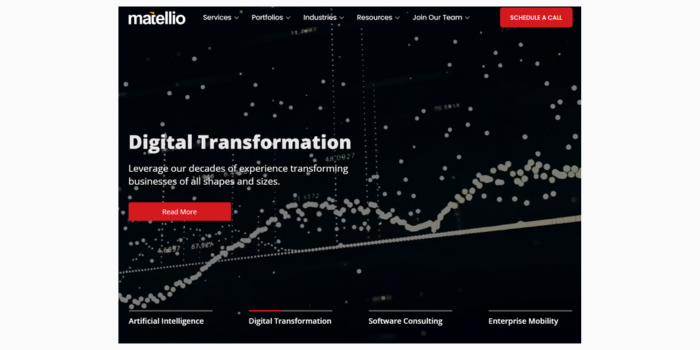
Matellio is a global software engineering studio delivering robust AI-powered solutions across sectors like education, finance, and logistics.
Their conversational AI work includes intelligent assistants, speech-recognition platforms, and data-driven service apps—like AIBRT, an EdTech system that uses voice tech to streamline district-level education oversight.
Key Services
AI chatbot and voice assistant development
NLP integration and workflow automation
AI-based analytics and reporting platforms
Centralized education + service platforms (speech-enabled)
End-to-end platform development with enterprise scalability
Industries Served
Healthcare, EdTech, Finance, On-Demand Services, Retail, Logistics
Ideal For
Enterprises and funded startups seeking scalable, secure AI platforms with deep backend customization
Location: USA and India
Hourly Rate: $50–$99/hr
Clutch Rating: 4.8/5
Also Read: Top Voice AI Agent Development Companies to build your voice ai agents for your business.
Key Features of Top Conversational AI Development Companies
Not all conversational AI companies offer the same depth or capability. While many claim to build bots, only a few can deliver scalable, secure, and context-aware systems that handle real-world complexity.
Here’s what sets the top conversational AI development companies apart:
1. Domain-Specific NLP Expertise
They don’t just use generic language models. The best firms fine-tune NLP for your industry, whether it’s healthcare, finance, or e-commerce.
This includes training on your data, integrating custom taxonomies, and supporting multilingual conversations out of the box.
2. Real-time Context Handling and Memory
Good bots respond whereas great bots remember. An expert development team builds systems that track user sessions, carry over context across interactions, and personalize responses based on prior conversations without needing constant reprogramming.
3. End-to-End Development, Not Just Chatbot Scripts
Top firms build full pipelines:
User experience design
NLP model training
Backend integration
Analytics setup
Security and compliance
They will deliver you a working product that is ready to deploy across multiple channels.
4. Deep Integration Capabilities
Modern bots must talk to your tools. The best conversational AI platform providers offer custom connectors and API integrations with CRMs, ERPs, support tools, payment gateways, and knowledge bases. No data silo, no context loss.
5. Multi-Modal and Omnichannel Support
It’s not just about chat anymore. Top vendors support voice, chat, SMS, social messengers, and IVR—all from the same backend.
The best conversational AI platforms allow users to switch channels without starting over.
6. Training, Testing, and Improvement Loop
Deployment is just the beginning. Leading firms embed tools for bot testing, human-in-the-loop review, fallback intent capture, and model retraining. You get a self-improving system that learns from live usage.
7. Role-Based Dashboards and Conversation Analytics
You need to see what’s working and what’s not. Top providers offer detailed dashboards that show:
Top queries and intents
Drop-off points
Fallback rates
Escalation trends
This helps teams continuously improve performance.
8. Enterprise-Grade Security and Compliance
An expert team follow strict standards:
End-to-end encryption
Access controls
GDPR, HIPAA, or SOC 2 readiness
They build with compliance in mind which is critical for sectors like banking, healthcare, or government.
9. Scalable Architecture
These companies build systems that handle millions of conversations across languages, geographies, and time zones.
They support cloud, hybrid, and on-premise deployment options depending on your infrastructure.
10. Transparent Collaboration Model
What makes the top conversational AI development companies stand out is how they work. They offer shared roadmaps, clear documentation, ongoing support, and training sessions, not just one-time handoffs.
If you’re evaluating top conversational AI companies, don’t just ask what they’ve built, ask how well it’s scaled, how fast it was deployed, and what results it delivered. The right partner will act like a product team, not a chatbot vendor.
How to Choose the Right Conversational AI Development Company
After exploring the top conversational AI Development companies of 2025, the next step is choosing the right partner for your specific goals. Not every vendor will fit your needs and that’s okay.
What matters most is aligning with a team that understands your business context, has the technical maturity to deliver, and can evolve with you over time.
Here’s a detailed checklist to guide your evaluation:
1. Technical Expertise and Breadth of Services
Start by assessing the company’s core technical capabilities.
Are they building more than just basic FAQ bots?
A strong partner should offer full-spectrum conversational AI development including chatbots, voicebots, virtual agents, and NLP-driven assistants.
Pay close attention to the tools they use. Frameworks like GPT, Rasa, Dialogflow, Amazon Lex, and Microsoft Bot Framework signal maturity.
Also, see if they can support deployment across multiple channels (web, mobile apps, messaging platforms) and whether they have experience integrating bots into real business systems like CRMs, ERPs, or customer service platforms.
2. Relevant Industry Experience
Context matters. Companies that have already built conversational AI solutions in your industry will better understand your challenges, user behavior, and compliance needs.
Whether you’re in healthcare, BFSI, eCommerce, or education, ask if they’ve solved problems similar to yours. Bonus points if they offer detailed case studies or can share outcomes like time savings, improved conversions, or workflow automation.
For regulated industries, check how they address data privacy, compliance (HIPAA, GDPR), and domain-specific nuances.
3. Track Record of Delivery
Strong marketing is easy. Proven delivery is harder. Evaluate the company’s reputation through independent reviews like Clutch ratings, testimonials, or recent project references.
Look for evidence of consistent performance, especially in projects similar to yours. Try to understand the impact of their work:
Did their chatbot reduce response time?
Did their AI assistant improve onboarding efficiency?
You want real results backed by data, not just polished interfaces.
4. Scalability and Long-Term Flexibility
Today’s AI MVP may become tomorrow’s core business tool. The solution you build now should be designed to scale whether that means serving more users, handling more use cases, or integrating with more systems down the road.
Make sure the team can build architecture that supports modular growth, language expansion, and integration with new platforms.
Also consider how easy it will be to maintain and update the system as your needs evolve.
5. Security and Compliance Practices
Security is not optional, especially if your conversational AI will handle sensitive information. A reputable company will follow security standards and be transparent about data handling.
Look for familiarity with regulations like HIPAA, GDPR, SOC 2, or ISO 27001.
They should have clear processes for access control, data encryption, consent management, and storage. Even better if they’ve completed formal security audits or have certifications in place.
6. User Experience and Customization Approach
Even the most powerful AI will fail if it doesn’t align with your users. A good partner will work closely with you to define your tone, use cases, and brand voice and build a bot experience that feels natural, responsive, and on-brand.
Ask how they handle conversation design, user testing, and iteration. Also check how easy it is to update responses, flows, or integrations without needing to rebuild from scratch. You want long-term flexibility, not dependency.
7. Analytics and Performance Tracking
The best conversational AI systems are those that can be measured. Check if the company provides analytics dashboards to monitor user behavior, drop-off points, and engagement trends.
They should be able to track and report key performance indicators like resolution rate, time to respond, CSAT (customer satisfaction), cost reduction, and usage patterns.
The more visibility you have, the easier it is to improve over time.
8. Engagement Models and Pricing Flexibility
Budgets and timelines vary across businesses, so flexibility in how the company works matters. Explore whether they offer different models like fixed-price, time-and-material, or outcome-based pricing.
If you’re just getting started, look for partners open to pilot phases or proof-of-concept builds before committing to a full rollout.
Transparency around timelines, scope, and communication rhythms is also key for avoiding hidden surprises mid-project.
9. Team Structure and Collaboration Practices
Beyond the tech, your day-to-day experience will depend on the people. Ask if you’ll have access to a dedicated product manager or delivery lead.
Try to understand their process, whether it’s Agile, Scrum, or a hybrid approach and how they keep you in the loop during development.
Strong teams will offer regular updates, milestone reviews, and clear documentation. If senior engineers or founders are involved in your project, it’s a good sign of commitment and quality.
10. Innovation Mindset and Differentiators
Finally, look for signs that the company stays ahead of the curve.
Are they experimenting with generative AI, large language models (LLMs), or multimodal interfaces?
Do they have in-house tools, accelerators, or reusable frameworks that speed up delivery or reduce cost?
Great partners often have their own IP, whether it’s a conversation design tool, a library of reusable intents, or internal R&D around new AI capabilities. This can give your project a real edge.
Final tip
Choose a partner who’s not just strong on paper but aligned with your business reality. Look for teams who are curious, outcome-driven, and open to long-term collaboration.
The best conversational AI solutions are built when strategy, tech, and execution come together, and the right partner can help you get there faster, with fewer surprises.
Use Cases: How Businesses Use Conversational AI
As the capabilities of AI continue to evolve, businesses across industries are adopting conversational AI systems not just for efficiency, but to fundamentally improve how they interact with customers and internal teams.
Leading conversational AI companies are no longer building simple bots for FAQs. Instead, they're developing intelligent agents that operate across customer support, sales, operations, and internal functions.
Below are some of the most common and impactful use cases of conversational AI being implemented at scale.
1. Customer Support Automation
One of the most widespread use cases for conversational AI is in automating customer support. Traditional human-only support teams struggle to meet high-volume demand, especially during peak hours, holidays, or product launches.
With a conversational AI chatbot in place, businesses can provide 24/7 assistance without adding headcount.
These bots can resolve tier-1 issues like order status, password resets, refund policies, and product FAQs, instantly. The result is faster response times, reduced ticket backlogs, and higher customer satisfaction.
2. Lead Qualification and Sales Funnel Optimization
Marketing and sales teams use conversational AI to automate the initial stages of lead capture and qualification.
Instead of relying on static web forms or delayed email follow-ups, AI chatbots engage visitors in real time, asking relevant questions, segmenting leads based on criteria like company size or use case, and passing qualified leads directly into the CRM or to a sales rep.
This reduces drop-offs in the funnel, shortens response time, and increases the conversion rate of marketing campaigns.
3. Appointment Booking and Scheduling
Industries that depend on scheduled interactions such as healthcare, education, wellness, or professional services, benefit significantly from automated appointment systems. A conversational AI platform can be integrated with calendars and booking software to manage scheduling, confirmations, reschedules, and reminders.
This reduces the administrative workload, eliminates scheduling errors, and improves the user experience by offering frictionless booking through preferred channels like WhatsApp, Messenger, or SMS.
4. Internal Helpdesk Automation (IT and HR)
Beyond customer-facing roles, conversational AI is increasingly being used within companies to support employees. Large enterprises face thousands of repetitive internal queries, from resetting passwords to checking leave balances or onboarding tasks.
Deploying an AI-powered helpdesk bot on internal platforms like Slack or Microsoft Teams can dramatically reduce support load on IT and HR departments, improve response times, and ensure policy consistency across locations or departments.
5. Multilingual and Localized Customer Engagement
Global businesses often struggle to provide consistent support across regions and languages. Traditional approaches require separate human teams for each language, leading to inconsistencies and high costs.
Conversational AI chatbot companies now offer multilingual support, allowing the same bot to engage users in multiple languages with native-level fluency. This not only reduces support costs but also expands a brand’s reach into new markets without increasing operational complexity.
6. Guided Product Discovery in E-commerce
In digital commerce, users often face decision fatigue when browsing large catalogs. Conversational AI helps streamline product discovery by engaging users in a guided conversation to understand their needs and recommend products.
These bots act as digital sales assistants, asking preference-based questions, filtering options, and even upselling or cross-selling. This approach improves product visibility, shortens decision time, and increases average order value.
7. Voice-Driven Interaction for Call Centers
For industries with high call volumes, such as telecom, banking, or insurance, conversational AI platforms with voice capabilities are replacing outdated IVR systems. Instead of pressing buttons to navigate menus, users speak naturally and get instant responses.
These AI voicebots handle tasks like account verification, service activation, bill queries, and more. Voice-based AI not only reduces call handling time but also frees human agents for more complex support tasks.
8. Automated Feedback and Survey Collection
Traditional feedback methods like email surveys often see low response rates. Conversational AI enables real-time, conversational feedback collection through channels users already engage with features like chat widgets or messaging apps.
By using a friendly, dialog-based format, businesses are able to gather structured feedback without overwhelming the user. This improves survey completion rates and helps organizations capture better insights for product and service improvement.
Each of these use cases highlights the real business value of investing in the right conversational AI companies.
The most effective implementations are those that are well-integrated into existing systems, trained on relevant data, and built with a clear understanding of user intent and business objectives.
Final Thoughts
Choosing the right conversational AI partner is about finding a team with great technical skills that understands your goals, your users, and the kind of experience you want to create.
Whether you’re building a smart assistant for onboarding, a voice bot for real-time decisions, or automating customer support, the companies listed above bring real-world experience, strong delivery, and long-term thinking.
As AI adoption continues to grow, the difference between a good solution and a great one often comes down to the partner you pick.
Use this guide as a starting point, ask the right questions, and choose a team that fits both your product and your pace.
If you're exploring options, RaftLabs can help you design and deliver conversational AI systems tailored to your workflow, without overengineering.
Frequently Asked Questions
Conversational AI uses natural language processing (NLP) and machine learning to enable more human-like interactions. Unlike basic chatbots, it can handle complex queries, remember context, and improve over time.
Costs vary widely based on complexity, features, and channels. Basic bots may start around $10,000, while enterprise-grade solutions can range from $50,000 to $200,000 or more. Visit our pricing page for more information.
Conversational AI is making a strong impact across multiple industries by improving efficiency, enhancing customer experiences, and reducing operational costs.
While its use is growing everywhere, a few sectors are seeing especially high returns:
Healthcare – For symptom triage, appointment scheduling, and remote patient support
Finance & Fintech – For onboarding, loan assistance, fraud alerts, and customer service
Retail & eCommerce – For personalized shopping help, order tracking, and returns
SaaS & Tech – For product onboarding, user support, and feedback collection
Education – For student engagement, virtual tutoring, and admin help
Logistics & Transportation – For shipment tracking, driver coordination, and customer updates
Hospitality – For reservations, guest inquiries, and multilingual support
These industries benefit most because they rely on high-volume, high-touch interactions that conversational AI can streamline or automate.
Timelines vary by complexity. A simple chatbot MVP can go live in 6 to 8 weeks. More advanced, multi-intent or voice-enabled systems with integrations may take 12 to 14 weeks. Clear goals, use cases, and fast feedback loops can speed up delivery.
Yes, most mature conversational AI platforms support integration with CRMs, ERPs, support desks, analytics tools, and internal databases via APIs or SDKs. A good partner will ensure smooth handoff between your AI assistant and backend systems for real-time actions and reporting.



